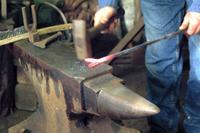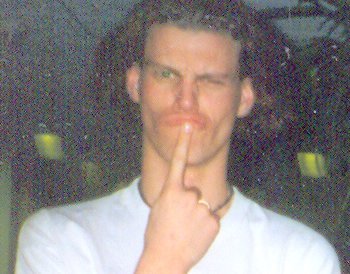The Apprentice
 John 5 - Part 4
John 5 - Part 4In a curious move, Jesus not only tells the invalid to "Rise," he also instructs him to pick up his mat. The invalid scampers off, but is confronted by some religious authorities who inform him that it is against the law to carry a mat on the Sabbath. The man is happy to tell them that it was Jesus who instructed him to carry stuff, perhaps they should take it up with him.
Which they do.
Now, when confronted, Jesus begins to unpack the signs. He announces in a controversial setting what his miracles mean. He says to them, "My Father is always at work to this very day, and I too am working" (v.17). These authorities are enraged, and John tells us that they are now bent on killing Jesus. But why? There are numerous references to Yahweh as Father in the Hebrew scriptures. Why would this set off the authorities.
Let's set up what Jesus is doing here by asking a few questions:
"Does God worship idols?"
Probably not.
"Does God misuse the name of God?"
Only when he hits his thumb with a hammer...Nah, he's got restraint.
"Does God covet anyone else's donkey or ox or maidservant?"
Maybe if it was the Ox 3000...well...no, again, probably not.
"Does God work on the Sabbath?"
Um....
Jewish philosophers had actually concluded that God does work on the Sabbath. Life is created on the Sabbath. The natural order is held together on the Sabbath. It's not like every Saturday the second law of thermodynamics fails. So, these philosophers came to the conclusion that there were rules that applied to men and there were other rules that applied to God.
By healing and commanding a man to walk on the Sabbath, Jesus is saying there are rules that apply to you, and then there are rules that apply to Me. I live according to the God-Rules. God is my unique Father and I am the unique Son of God.
Jesus unpacks it a bit more, in case they missed it, "I tell you the truth, the Son can do nothing by himself; he can do only what he sees his Father doing, because whatever the Father does the Son also does" (v.19).
Want to know what the miracles I've been doing are about? Want to know what the signs are pointing to? I am an apprentice to my Father. I watch what he does and I do the same. I watch my Father tell men to go, to put faith in his bare words, and I do the same. I watch Him confront gods that are lame and useless through fantastic displays of power, and I do the same. I watch him set men free. "Just as the Father raises the dead and gives them life, even so the Son gives life to whom he is pleased to give it." (v.21 & 24).
John does something here that is wonderful. John is writing his biography of Jesus in Greek, but Jesus originally spoke Aramaic. So, John is translating Jesus words for a new culture, and he inserts a concept that Greek speakers would be familiar with into Jesus mouth. There are two words for "life" in Greek. The first is "Bios." It is where we get our word "biology." It refers to the kind of life found in animals. Our fleshy, bodily life is bios-life. When Jesus says, "No one takes my life, I lay it down of my own accord," he uses the word "bios."
But, the second word for life in Greek is "Zoe." This is a different kind of life. It is the kind of life the gods have. The gods don't have animal bodies. They don't have this fleshy stuff. They have Zoe. They have God-life. John is saying that Jesus is making people Alive in a new way: in the same way God is alive. This theme of life--of everlasting, eternal life--runs through out John's gospel. It also begins the book of Genesis.
Genesis starts with God creating the universe, our world, and us. "The Lord God formed the man from the dust of the ground and breathed into his nostrils the breath of life and the man became a living being...The Lord God took the man and put him in the Garden of Eden to work it and take care of it. And the Lord commanded the man, 'You are free to eat from any tree in the garden; but you must not eat from the tree of the knowledge of good and evil, for when you eat of it you will surely die'" (2:7 &15-17).
What happens next? Well, we know the man and his lady friend are rather careless. The two of them go ahead and eat from the tree, and they immediately fall down dead, and God has to create new people.
No! What happens?
God comes and asks if they have eaten from the tree of the knowlegde of good and evil. Of course they have, so he removes them from the garden. Genesis goes on to tell us that Adam lived for 800 more years (5:3-5). He didn't die!
Well... he did, but in a more profound and significant way. He did not die in the Bios way. He died in the Zoe way. He is a being that no longer lives in the way he was meant to. He was meant to be a son of God. He was meant to live in the presence of God. But he abandoned it all.
Fast-forward to the end of John's Gospel. Jesus has been executed, but has risen from the dead. His disciples are confused and gather together, and all of sudden Jesus steps into their midst, and what happens? "Jesus said, 'Peace be with you! As the Father has sent me, I am sending you.' And with that he breathed on them and said, 'Receive the Holy Spirit'" (20:21).
Bang! "Whatever the Father does the Son also does" (5:19).
What is going on? Jesus is making men alive again! "I tell you the truth, a time is coming and has now come when the dead will hear the voice of the Son of God and those who hear will live" (5:25-26).
Paul puts it this way: "If anyone is in Christ he is a new creation; the old has gone, the new has come!" God is breathing Zoe-Life into men once again, and John says it over and over again:
"In Jesus was LIFE;" "Whoever believes in the Son has eternal LIFE;" "The Son gives LIFE to whom he is pleased." Jesus says, "I am the way, the Truth, and the LIFE;" "I am the resurrection and the LIFE;" "I am the bread of LIFE...This bread is my flesh which I give for the LIFE of the world;" "I have come that they may have LIFE and have it to the full;" "The words I have spoken to you are spirit and they are LIFE;" "I give them LIFE and they shall never perish." And John concludes his book by saying, "These things are written that you may believe that Jesus is the Christ, the Son of God, and that by believing you may have LIFE in his name."
Do you want to get well?
Jesus has entered a beautiful world filled with broken people fighting to get the scant, insignificant goodies before them. He calls to broken individuals, and he asks them--in their pain and delusion--do you want LIFE?
"I tell you the truth, whoever hears my words and believes him who sent me has eternal life and will not be condemned; he has crossed over from death to Zoe" (5:24).
Believe.

0 Comments:
Post a Comment
<< Home